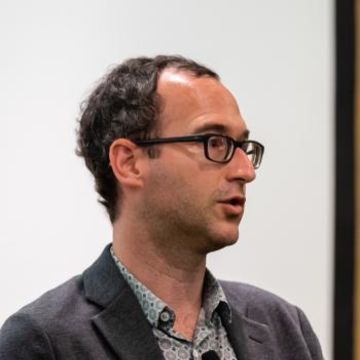Dan Edelstein
William H. Bonsall Professor in French and Professor, by courtesy, of History
Courtesy
Ph.D., University of Pennsylvania, French (2004)
Licence ès Lettres, Université de Genève, French, English, Latin (1999)

Born in Ithaca, NY, I moved to Geneva, Switzerland when I was eleven. After attending the Collège Calvin, I studied French literature at the University of Geneva; I then returned to the U.S. to pursue graduate studies at the University of Pennsylvania, graduating in 2004. I joined the Department of French and Italian at Stanford that same year.
I work for the most part on eighteenth-century France, with research interests at the crossroads of literature, history, political thought, and digital humanities (DH). I am the author of three books (all with the University of Chicago Press): the first on French revolutionary Terror; the second on the genealogy of the Enlightenment; and the third on the early-modern history of human rights. I've also edited or co-edited six volumes of essays: "Myth and Modernity" (co-edited, Yale French Studies); "The Super-Enlightenment" (Voltaire Foundation, at Oxford University); "Scripting Revolution" (co-edited with Keith Baker, Stanford University Press); "Let There Be Enlightenment" (co-edited with Anton Matytsin, Johns Hopkins University Press); "Networks of Enlightenment" (co-edited with Chloe Edmonson, Oxford University Studies in the Enlightenment); "Power and Time" (co-edtied with Stefanos Geroulanos and Natasha Wheatley, University of Chicago Press). I'm a co-PI for the "Mapping the Republic of Letters" project, and the founding faculty director of the "Humanities + Design" research lab at CESTA.
I'm currently at work on two book projects: an intellectual history of revolution, and a defense of core curricula in higher education. I also continue to work on a variety of DH projects.
I regularly teach courses on the literature, philosophy, culture, and politics of the Enlightenment; nineteenth-century French novels; the French Revolution; early-modern political thought; French intellectual culture (“Coffee & Cigarettes”); liberal education ("Education as Self-Fashioning"); and historical networks ("Networks: Ecological, Revolutionary, and Digital").
I work for the most part on eighteenth-century France, with research interests at the crossroads of literature, history, political thought, and digital humanities (DH). I am the author of three books (all with the University of Chicago Press): the first on French revolutionary Terror; the second on the genealogy of the Enlightenment; and the third on the early-modern history of human rights. I've also edited or co-edited six volumes of essays: "Myth and Modernity" (co-edited, Yale French Studies); "The Super-Enlightenment" (Voltaire Foundation, at Oxford University); "Scripting Revolution" (co-edited with Keith Baker, Stanford University Press); "Let There Be Enlightenment" (co-edited with Anton Matytsin, Johns Hopkins University Press); "Networks of Enlightenment" (co-edited with Chloe Edmonson, Oxford University Studies in the Enlightenment); "Power and Time" (co-edtied with Stefanos Geroulanos and Natasha Wheatley, University of Chicago Press). I'm a co-PI for the "Mapping the Republic of Letters" project, and the founding faculty director of the "Humanities + Design" research lab at CESTA.
I'm currently at work on two book projects: an intellectual history of revolution, and a defense of core curricula in higher education. I also continue to work on a variety of DH projects.
I regularly teach courses on the literature, philosophy, culture, and politics of the Enlightenment; nineteenth-century French novels; the French Revolution; early-modern political thought; French intellectual culture (“Coffee & Cigarettes”); liberal education ("Education as Self-Fashioning"); and historical networks ("Networks: Ecological, Revolutionary, and Digital").